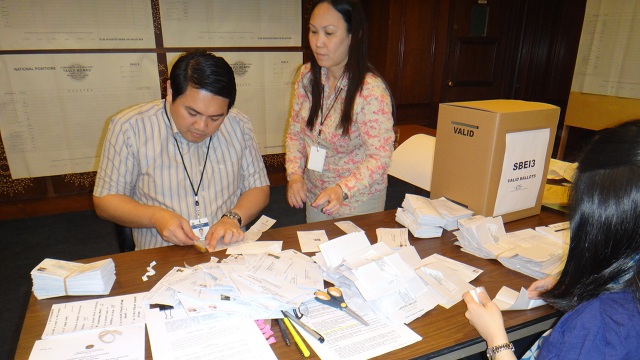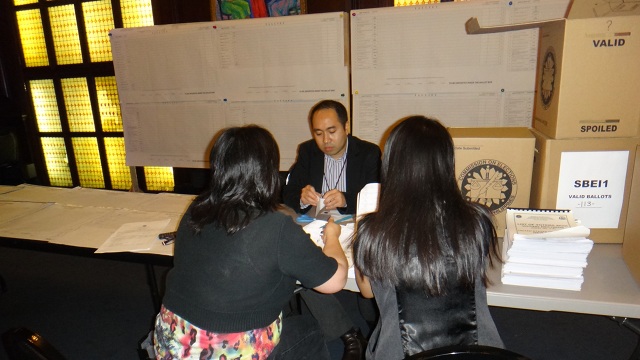SUMMARY
This is AI generated summarization, which may have errors. For context, always refer to the full article.
I was up at 4 a.m. and by the time me and my wife began walking down 5th Avenue toward the Philippine consulate, rays of pale yellow sunlight splashed across the tops of New York city’s skyscrapers.
It was odd seeing 5th Avenue this way. Normally, the wide road would be packed with tourists from around the world during the Christmas holidays. Now, it is eerily empty, looking much like a scene from a zombie movie before the walking dead attacked.
A few blocks from the subway stop stood the Philippine Consulate, where deputized election officials will begin counting the votes of Filipinos from 10 states in the Northeastern United States for the 2013 mid-term elections.
Consul-General Mario Lopez de Leon Jr. said the deadline for the ballots to be at the consulate was 7 a.m. Eastern time. Overnight, 6 more ballots came in.
A total of 2,377 ballots were cast by Filipinos in the 2013 elections, almost 12% lower than the 2,700 who voted when Benigno Aquino III won the presidential election in 2010.
“We expected more,” de Leon told exactly 3 reporters in Kalayaan hall where 4 of the 6 election board inspectors set up shop.
Under the high-vaulting ceiling of the old building, election tally boards were set up with the names of each Senatorial candidate.
I felt like I was attending Church or even a funeral given how silent it was, sans the corpse, of course.
The level of interest in this election in the U.S. Northeast was markedly placid. Apparently, there was more interest in the presidential election 3 years ago and this may have accounted for the lower turnout.
“Nobody campaigned here,” de Leon said, adding though the overseas vote may become critical in the race for the 12th Senatorial slot if the difference is just a few hundred votes.
It was an early Monday morning and the city was trying to shake off the stupor of the weekend. It was supposed to be spring, but it was unnaturally cool as people strode around bundled up in winter coats.
Half a world away from the often charged atmosphere of a Philippine election, the vote counting here is blessedly stress-free, even downright sleepy. I almost nodded off while one set of inspectors opened the mailed-in ballots.
The vote counting here though is ‘old school.’
There is no computer tallying up the votes. Everything is done by hand, with an election chairman and two assistants inspecting the ballot to make sure the vote is legitimate.
How slow is the process going to be?
Well, it is going to take the Consulate 13 hours, more or less, to count 2,377 votes. So these people are going to be here until well into the night.
“The way we do it here is similar to the way we did the counting before,” de Leon said.
It is the same style of vote counting that was in place in 1992. Back then, the election was held in May, but Fidel Ramos was not declared the winner until June.
The election officials are supposed to be given 2 minutes to look at each ballot, looking for any mistake in the way it was sent or signed.
In the Philippines, the vote is now computerized. But in the world of Philippine politics, there are persistent suspicions about vote padding and hacking of the voting machines to manipulate the results.
Deputy Consul General Tess de Vega, who is chairperson of one group of election inspectors, called it a lingering “mistrust” of the system.
I still remember the small army of lawyers crowded into the Comelec offices in Manila scrutinizing every election return from up and down the country. That was mortifyingly riveting.
Aside from the Senatorial tally, the Consulate was also counting the party-list vote. Once the counting is done, the results will be sent and announced by the Philippine embassy in Washington, DC.
Consul-General de Leon smiled when asked if he jotted down all 12 names for Senator, given that many Filipinos will probably vote for less than 10 or so.
“I decided to fill it up. It’s a little tough,” he said. – Rappler.com
Note: Rene Pastor is with Philippine Commodities Digest, a weekly publication of New Jersey-based A & V Media that provides a comprehensive roundup of developments and trends in the country’s key farming and mining sectors. He is a freelance journalist who worked with the news agency Reuters for nearly 23 years. He graduated with a Masters degree in International Affairs from the New School in New York city and received a bachelor of arts in Communications from the Ateneo de Manila University. Rene is also a lecturer at Middlesex County College in Edison, New Jersey.
Add a comment
How does this make you feel?


There are no comments yet. Add your comment to start the conversation.